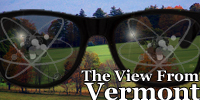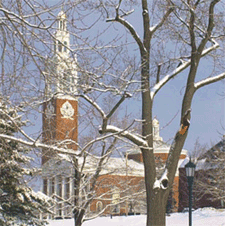Gwyneth Cravens talks about nuclear energy in Vermont
View from Vermont
 Gwyneth Cravens came to Vermont last week for a full plate of speaking engagements and media interviews. Howard Shaffer, myself, and John McClaughry of the Ethan Allen Institute had planned for weeks her visit to Vermont. I was tired of seeing the constant parade of anti-nuclear people like Helen Caldicott, Paul Gunther of Beyond Nuclear, and others come up to Vermont.
Gwyneth Cravens came to Vermont last week for a full plate of speaking engagements and media interviews. Howard Shaffer, myself, and John McClaughry of the Ethan Allen Institute had planned for weeks her visit to Vermont. I was tired of seeing the constant parade of anti-nuclear people like Helen Caldicott, Paul Gunther of Beyond Nuclear, and others come up to Vermont.
It was about time we dispelled some of the gloom of ignorance with a solid pro-nuclear talk!
The action
Craven's media appearances started before her trip started, with two radio interviews while she was still in California. One was on WDEV, the Mark Johnson show, and you can hear it here:
Her other interview was on Vermont Public Radio's morning edition, but I have been unable to find a link. VPR may not yet have archived Cravens' appearance.
On Thursday in Vermont, Cravens
- had breakfast with supporters at the Burlington Sheraton
- gave a rushed talk to legislators in the State House in Montpelier
- spoke to students and faculty at the University of Vermont in the afternoon (sponsored by the Gund Institute for Ecological Economics)
- addressed the Ethan Allen Institute's Sheraton Economic Series at the Burlington Sheraton in the evening (click here for video of her presentation).
The next day, she gave a long interview with True North Reports, a start-up Web magazine. Then she flew home.

Cravens
By the end of the day on Thursday, Cravens had given three one-hour talks in three separate venues in two cities. An immense and successful effort! The talks were recorded by cable companies and a documentary film maker. All the seats were filled in the State House Committee room and the Sheraton Economic Series. At the University of Vermont, we still had seats available, but the faculty sponsor looked at the 30 students and said that this was a "good crowd" for the type of event we were holding.
The results
What worked? What didn't?
Mostly, everything worked. The talk to the legislators was rushed because we basically had the committee room for only 45 minutes during the lunch hour, and there was time only for one question. We were handing out free copies of her book, Power to Save the World, and 20 legislators took copies. As a courtesy, John McClaughry of the Ethan Allen Institute also brought a copy of the book to the offices of Vermont Lt. Gov. Phil Scott and Gov. Peter Shumlin.
Sometimes, victories are smiles and sometimes they are scowls. I saw some scowls on the faces of a few plant opponents in the State House hallways. I always love it when one particular senator scowls at me. He is an ardent plant opponent, and when he gives me a dirty look, it means I have done something right!

University of Vermont
Because we had more time, the UVM talk went more smoothly. At the university, as in her book, Cravens talked about her journey from someone who was automatically anti-nuclear to someone who became a nuclear proponent. This story of increased knowledge and changed views definitely resonated with the students. Most of the student questions were thoughtful, and the question period ended on an unexpected high note. The last question was a statement by one grad student, who had become convinced that nuclear was the future. I talked with the student afterward. He is an engineering student and working on wind turbines. He has become quite certain that wind turbines will have limited utility, and so he has been looking at other methods of making power. Of course, he likes nuclear.
The crowd at the Ethan Allen Institute talk in the evening was older and more conservative than the students at University of Vermont. The good news was that they were already mostly nuclear supporters. The bad news was that several of them objected to Cravens' description of global warming. Cravens handled their questions very well, and one person told me that she thought the question period had been the best part of the presentation. I consider that a true compliment to Cravens.

Exit sign containing tritium
Another great part of the evening talk was Howard Shaffer's show-and-tell. Shaffer bought (on Amazon.com) a tritium-containing exit sign with seven curies of tritium. Pointing out that he held, in his hand, about seven times the entire amount of tritium that had leaked from Vermont Yankee definitely had an impact.
The bottom line
We supported our friends in the legislature, who left the meeting with big smiles. We at least partially discomfited the plant opponents there. Students were receptive to Cravens' talk, and conservatives were also won over by her knowledge during the question period.
This event was unique in the recent history of Vermont, which has had several visits from Helen Caldicott, but no visits (before this one) from out-of-state nuclear experts. We had some media coverage, but I wish there were more. I also wish that we had more legislators in the room, and maybe even a few Democrats in attendance. (Knowledgeable people said that all the legislators present were Republicans.)
The bottom line is that it was a start. It was a beginning. We were a presence. One swallow does not make a summer, and one set of appearances does not make a victory. But they help.

Angwin
Meredith Angwin is the founder of Carnot Communications, which helps firms to communicate technical matters. She specialized in mineral chemistry as a graduate student at the University of Chicago. Later, she became a project manager in the geothermal group at the Electric Power Research Institute (EPRI). Then she moved to nuclear energy, becoming a project manager in the EPRI nuclear division. She is an inventor on several patents. Angwin serves as a commissioner in the Hartford Energy Commission, Hartford, Vt.
Angwin is a long-time member of the American Nuclear Society and coordinator of the Energy Education Project. She is a frequent contributor to the ANS Nuclear Cafe.










